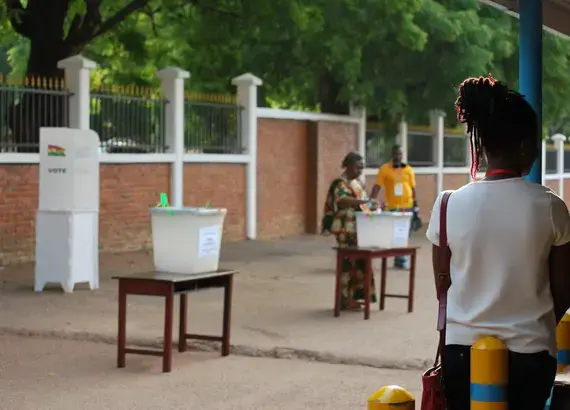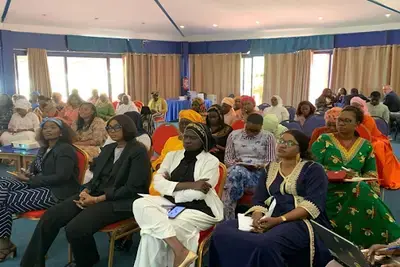
Success Story
With All Eyes on Ghana, NDI Observers Applaud the Country’s Peaceful Elections
In early December, 30 delegates from 14 countries and four continents began arriving in Accra, Ghana for NDI’s international election observation mission. Experts had warned that the December 7, 2016 election, much like the 2012 election, would likely be very close. But this time there were fears of violence and low confidence in the country’s electoral institutions and staunchly partisan political actors.
“As the last African country to hold national elections of 2016, all eyes are on Ghana,” said Dr. Fomunyoh, senior associate and regional director for Africa at NDI and one of the delegation leaders. “We hope that the voices of citizens will be heard, as Ghanaians deserve nothing short of meaningful and peaceful polls.”

A polling agent greets NDI observers in the morning as he prepares to open his polling station in Accra.
In addition to Dr. Fomunyoh, the delegation’s other leaders included Ambassador Johnnie Carson, former assistant secretary for African Affairs, U.S. State Department; Hon. J. Yvonne Mokgoro, former justice, South African Constitutional Court and Mr. Pat Merloe, senior associate and director of elections, NDI.
The observers represented a very diverse group of political and civic leaders, elections experts and regional specialists. The delegation was comprised of approximately 50 percent women and gender and women’s participation was a major focus of the observation mission.
During their stay in Ghana, the observers participated in briefings on Ghanaian political and electoral processes from Ghanaian experts, political leaders, election administrators, representatives of civil society, as well as NDI staff. Delegates deployed in two-person teams to regional capitals across Ghana to meet with election administrators, parliamentary candidates, domestic observer groups and political and civic activists in these localities. On election day, observers visited polling sites in their area of deployment to watch the voting, tabulation of results and other aspects of electoral proceedings.
At the same time, NDI partnered with the Coalition of Domestic Election Observers (CODEO) who employed a Parallel Vote Tabulation (PVT) to independently verify the accuracy of the presidential election results as declared by the Electoral Commission (EC). CODEO deployed about 8,000 Ghanaians as trained, accredited, non-partisan observers, of which 1,500 were dedicated PVT rapid response observers. Their PVT results closely matched the EC results.
Despite initial concerns, the Ghanaian elections proceeded peacefully and fairly. In their preliminary statement, the NDI observers commended the Electoral Commission for its notable improvements since the 2012 polls and expressed appreciation for the efforts of other election stakeholders. In particular, the delegates praised all the presidential candidates for signing the December 1 Accra Declaration, which expressed each political party’s commitment to peaceful polls. Read the mission’s full statement here.

Ghanaian voters queue to cast their vote for president and parliament as security and polling officials stand watch in order to ensure an orderly process.
“The NDI delegation applauds the people of Ghana for the largely peaceful conduct of these elections, despite earlier apprehensions of political tensions and violence,” said Ambassador Johnnie Carson, co-leader of NDI’s observation mission. “Ghana has underscored its status as a beacon for democracy in the region and, though not without challenges, remains a laudable example for the entire continent.”
NDI’s election observation for the December 7 elections included two pre-election assessment missions in August and October 2016. The delegation conducted its activities in accordance with Ghanaian law and the Declaration of Principles for International Election Observation, and collaborated with other international observer missions that endorse the Declaration.
NDI’s international election observation mission in Ghana was funded by a grant from the Bureau of Democracy, Human Rights, and Labor of the U.S. Department of State. The Institute’s pre-election missions were funded by the National Endowment for Democracy (NED).
Published on December 29, 2016



